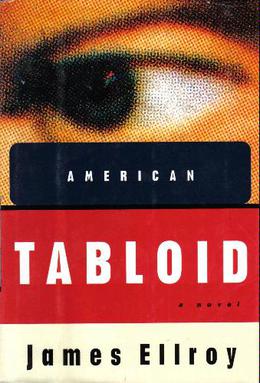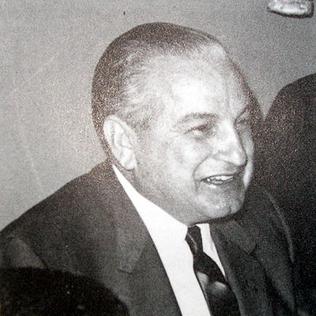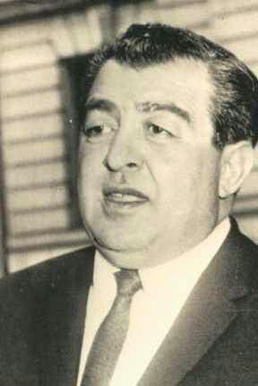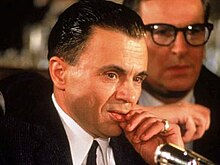
James Riddle Hoffa was an American labor union leader who served as the president of the International Brotherhood of Teamsters (IBT) from 1957 until 1971. He is notorious for his alleged ties to organized crime and for his disappearance under mysterious circumstances in 1975.

American Tabloid is a 1995 novel by James Ellroy that chronicles the events surrounding three rogue American law enforcement officers from November 22, 1958, through November 22, 1963. Each becomes entangled in a web of interconnecting associations between the FBI, the CIA, and the Mafia, which eventually leads to their collective involvement in the John F. Kennedy assassination.

Santo Trafficante Jr. was among the most powerful Mafia bosses in the United States. He headed the Trafficante crime family from 1954 to 1987 and controlled organized criminal operations in Florida and Cuba, which had previously been consolidated from several rival gangs by his father, Santo Trafficante Sr.

Hoffa is a 1992 American biographical crime drama film directed by Danny DeVito and written by David Mamet, based on the life of Teamsters leader Jimmy Hoffa. Most of the story is told in flashbacks before ending with Hoffa's mysterious disappearance. The story makes no claim to be historically accurate, and in fact is largely fictional. Jack Nicholson plays Hoffa, and DeVito plays Robert Ciaro, an amalgamation of several Hoffa associates over the years. The film features John C. Reilly, Robert Prosky, Kevin Anderson, Armand Assante, and J. T. Walsh in supporting roles. The original music score was composed by David Newman. The film was distributed by 20th Century Fox and released on December 25, 1992.

Carlos Joseph Marcello ;[Mor-sel-lo] born Calogero Minacore ; February 6, 1910 – March 3, 1993) was an Italian-American crime boss of the New Orleans crime family from 1947 to 1983.

Francis Joseph Sheeran, also known as "The Irishman", was an American labor union official and enforcer for Jimmy Hoffa and Russell Bufalino. He was accused of having links to the Bufalino crime family in his capacity as a high-ranking official in the International Brotherhood of Teamsters (IBT), the president of Local 326.

Timequest is a 2000 science-fiction film directed by Robert Dyke and starring Victor Slezak as John F. Kennedy, Caprice Benedetti as Jacqueline Kennedy, and Ralph Waite as the Time Traveler. The film also features Vince Grant and Bruce Campbell. After premiering on April 13, 2000, the film had a limited theatrical release in the United States, followed shortly by distribution on VHS and DVD to the United States, Canada, and Australia. Timequest explores the science fiction theme of altering the present day by traveling back in time and tampering with past events – specifically, preventing the assassination of John F. Kennedy.

Anthony Provenzano, also known as Tony Pro, was an American mobster who was a powerful caporegime in the Genovese crime family New Jersey faction. Provenzano was known for his associations with Jimmy Hoffa due to Provenzano's job as an International Brotherhood of Teamsters president for Local 560 in Union City, New Jersey.

Giovanni Ignazio Dioguardi, known as John "Johnny Dio" Dioguardi, was an Italian-American organized crime figure and a labor racketeer. He is known for being involved in the acid attack which led to the blinding of newspaper columnist Victor Riesel, and for his role in creating fake labor union locals to help Jimmy Hoffa become General President of the Teamsters.
Joseph Cotter Smith is an American stage, film, and television actor.
The assassination of John F. Kennedy and the subsequent conspiracy theories surrounding it have been discussed, referenced, or recreated in popular culture numerous times.

Dan E. Moldea is an American best-selling author and investigative journalist who has reported on organized crime and political corruption since 1974. He is the author of books about the rise and fall of Jimmy Hoffa, the contract killing of an Ohio businessman, the Mafia's penetration of Hollywood, its links to Ronald Reagan, and its influence on professional football, as well as works about the assassination of Senator Robert Kennedy, the O.J. Simpson murder case, the suicide of White House Deputy Counsel Vincent Foster, the Anthony Pellicano wiretapping scandal and prosecution, and corruption in higher education via the student-loan program and for-profit colleges.
Frank Ragano was a self-styled "mob lawyer" from Florida, who made his name representing organized crime figures such as Santo Trafficante, Jr. and Carlos Marcello, and also served as lawyer for Teamsters leader Jimmy Hoffa. In his 1994 autobiography Mob Lawyer, Ragano recounted his career in defending members of organized crime, and made the controversial allegation that Florida mob boss Santo Trafficante, Jr. confessed to him shortly before he died in 1987 that he and Carlos Marcello had arranged for the assassination of President John F. Kennedy in 1963.

Robert Francis Kennedy, also known as RFK, was an American politician and lawyer. He served as the 64th United States attorney general from January 1961 to September 1964, and as a U.S. senator from New York from January 1965 until his assassination in June 1968, when he was running for the Democratic presidential nomination. Like his brothers John F. Kennedy and Ted Kennedy, he was a prominent member of the Democratic Party and is considered an icon of modern American liberalism.
The United States Senate Select Committee on Improper Activities in Labor and Management was a select committee created by the United States Senate on January 30, 1957 and dissolved on March 31, 1960. The select committee was directed to study the extent of criminal or other improper practices in the field of labor-management relations or in groups of employees or employers, and to recommend changes in the laws of the United States that would provide protection against such practices or activities. It conducted 253 active investigations, served 8,000 subpoenas for witnesses and documents, held 270 days of hearings, took testimony from 1,526 witnesses, and compiled almost 150,000 pages of testimony. At the peak of its activity in 1958, 104 persons worked for the committee. The select committee's work led directly to the enactment of the Labor-Management Reporting and Disclosure Act on September 14, 1959.
Edward Grady Partin Sr., was an American business agent for the Teamsters Union, and is best known for his 1964 testimony against Jimmy Hoffa, which helped Robert F. Kennedy convict Hoffa of jury tampering in 1964.
Walter James Sheridan was an investigator for various agencies of the US government. He is best known for his role in the prosecution of Jimmy Hoffa, on which subject he published a book in 1972.

The Enemy Within: The McClellan Committee's Crusade Against Jimmy Hoffa and Corrupt Labor Unions is a book by American politician Robert F. Kennedy first published in 1960, and republished in 1994. Edwin Guthman, chairman of the Robert F. Kennedy Memorial provided the introduction to the 1994 edition. As Robert Kennedy was intimately involved, the book is somewhat autobiographical.
Robert F. Kennedy, the 64th United States Attorney General, a U.S. senator from New York, and the brother of United States president John F. Kennedy, has frequently been depicted or referenced in works of popular culture.
William Eugene Bufalino was an American attorney who represented the International Brotherhood of Teamsters (IBT) from 1947 until 1971. He retired in 1982. Bufalino worked closely with Jimmy Hoffa until 1971. Bufalino died on May 12, 1990.













